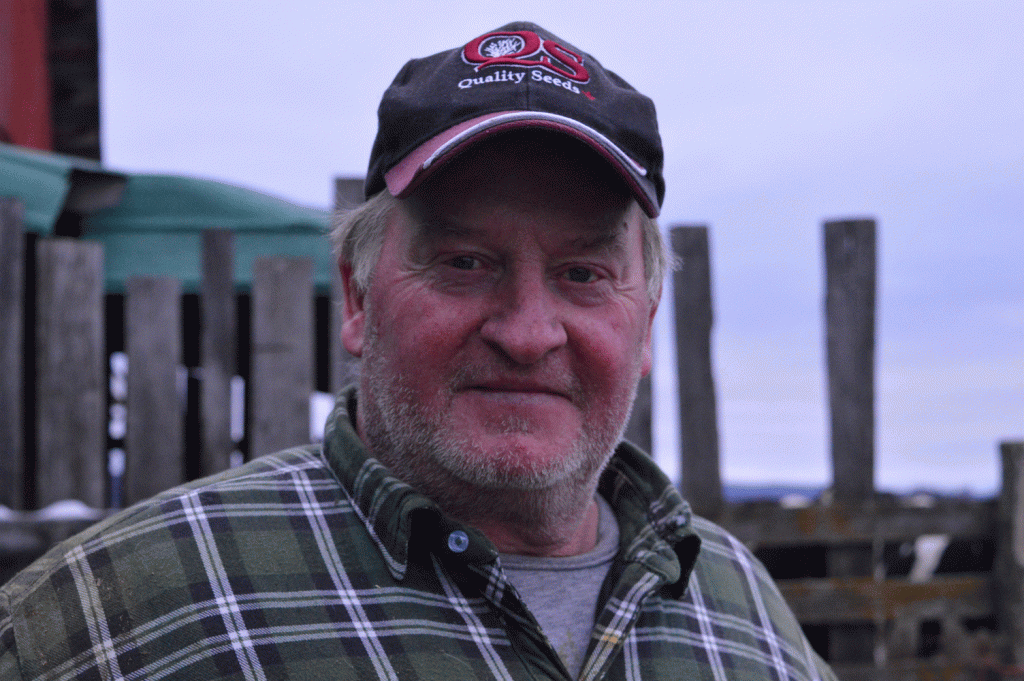TPP through the eyes of a dairy farmer
Gardell Hobbs was 13 when his father died of a heart attack, leaving a dairy farm that couldn’t be run by anyone in his family.
Instead, they changed their farming business from dairy to beef.
But just over a decade ago, a 45-year old Hobbs bought 15 dairy cows for his Dellaway farm in Quyon, Que. to extend the family business into a fourth generation. He now owns and milks 33 cows.
The grounds surrounding his barns are a thick mix of mud, cow dung, puddles of water and ice.
The sound of unexpected droppings of urine and feces interrupt the ramblings from a radio. These stick to the cows’ fur, drying up in no time. The barn is overwhelmed by the smell of the mix.
“The farm means everything to me,” says Hobbs, whose face has a tan absent from his exposed arm. He wears a baseball hat that reveals wisps of greying hair.
“It’s my living, it’s what I know, it’s what I do, it’s my roots, it’s everything. I can’t see myself doing anything else,” he adds.
Six weeks ago, during the federal election campaign, the Canadian government reached a Trans-Pacific Partnership free-trade deal with 11 other countries to facilitate international economic trade.
The partnership allows member-countries access to 3.25 per cent of Canada’s dairy market – introducing competition to an industry that has been protected since the early 1970s. For dairy farmers, it’s also a threat to the supply management or a “quota system” that has defined their market.
Hobbs described the quota as “a piece of paper that gives you the right to sell your milk.”
By Hobbs’s estimation, a cow costs $2,000. However, a dairy farmer pays another $25,000 to buy a quota to ship milk containing one kilogram of butter fat. This generally works out to one quota per cow. In turn, the price of milk is fixed at a price higher than other countries and the farmers are protected from competition.
“Even though it’s an expensive system to get into, it’s fairly profitable and it’s a good system,” Hobbs said.
But dairy farmers depend on bank loans to buy quota and Hobbs fears he won’t be able to pay off his loans under the TPP.
Over the years, Hobbs has bought quota that now allows him to ship 26 kilograms of butter fat per day. He makes two-thirds of his income from dairy, the other third he makes from beef. But he owes the banks approximately half the value of his quota.
“The price we get for our milk will go down. We’ll get the world price of our milk,” Hobbs said about the TPP becoming active.
“Right now, we have to have a higher price for our milk because we have to pay for the quota. The farmer will get less for milk, but the middle guy will benefit from the farmer’s loss. We just want them to leave it the way it is,” he added.
The secrecy that surrounded the TPP negotiations led dairy farmers to protest the partnership on Sept. 29 in Ottawa – riding in on tractors with cows in town.
Days later, a deal was reached with former Prime Minister Stephen Harper promising to compensate affected famers with $4.3 billion over a period of 15 years.
But Ian Lee, a professor of business at Carleton University has done research on the dairy sector’s supply management. He doesn’t see the reason for the fuss.
“We’re the only country in the word that protects their dairy market,” Lee said.
“I was hoping that the TPP would force Canada to terminate supply management because I have argued it is one of the most pernicious, immoral public policies, in Canada today because low income people spend more on food than high income people,” he added.
“Australia and New Zealand had supply management until 2000 and they got rid of their supply management sector and paid off their farmers with a special tax on milk for about ten years and then shut down supply management and went to a competitive dairy market.”
The new Liberal government’s trade minister Chrystia Freeland, has pledged that they will engage with Canadians before making a decision on whether to implement the deal signed by the outgoing Conservatives. The government is now reviewing the texts in the 6000-page agreement.
“We’re probably going to lose our supply management system in the long run. That means uncertainty for me and probably loss of income and right now a lot of uncertainty,” Hobbs said about the effect of the change in government.
At Dellaway farm, Andrew Hickey, who assists Hobbs with milking cows is a business administration student at John Abbott College in Montreal. He has a cow at the Dellaway farm and eight calves in his house. Although with no quota debts, he intends to raise small cows and sell them to people who don’t have enough cows to fill their quota.
“I have a passion for what I’m doing,” Hickey says. “It’s things like the TPP that scare me. Less farmers, less quota, less cows and less people from here to buy my product.”
Hobbs has plans just in case the TPP is as bad as he thinks.
“I’m going to wait until I get definite detail,” he says. “Before it all changes, once I get the details, I may just milk a few last cows and get rid of my debt. If I can pay my debt with a piece of paper, then the rest of my farm can move forward easier.”

